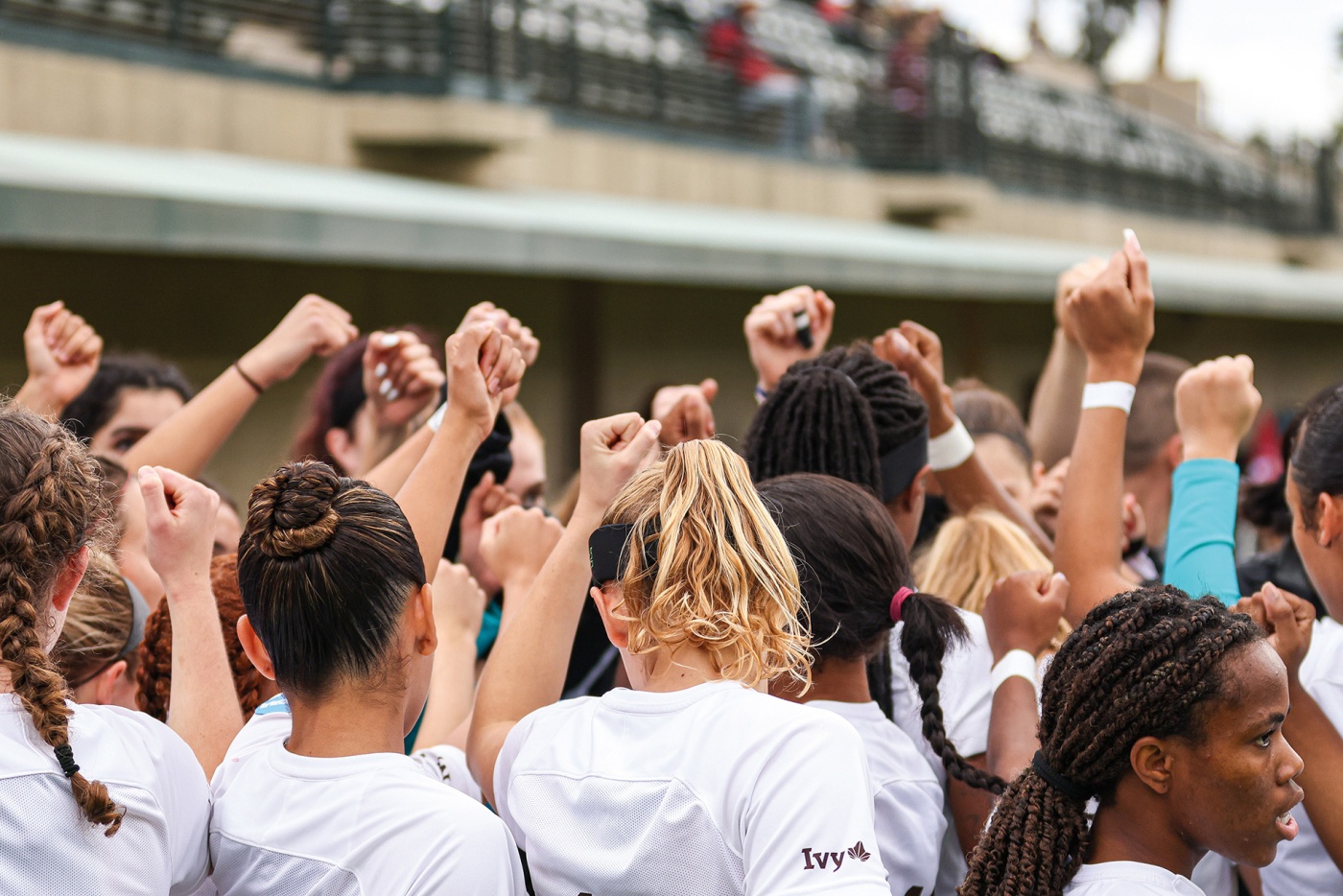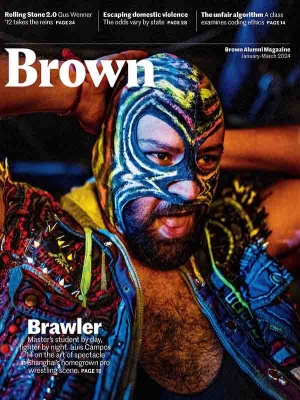Hot Play
Women’s soccer is dominating the Ivy League. It all started at a bonfire.

Just before the start of the 2019 season, members of the Brown women’s soccer team gathered for what they call their pre-pre-season tradition. The week before formal practices start, the women gather on campus to do some bonding and welcome the incoming freshmen. One night that year, the team had a bonfire and sat in a circle to state their intentions for the season. They talked about work ethic and celebrating each other, and pretty quickly one concrete goal emerged. They set their intention to win the Ivy League title, something Brown women’s soccer hadn’t done in 15 years.
The Bears’ star forward Brittany Raphino ’24 was just a freshman and this moment was one of her first experiences with the team. “When I think back to that, I get chills,” she says. “I feel like that conversation was really the start of all this.”
Since the night of the bonfire, the Brown women’s soccer team went 28 games without a loss in Ivy League play, won four Ivy League championships in a row, and played in four successive NCAA tournaments.
Of course, the team’s success can’t only be explained by the magic of the bonfire. Head coach Kia McNeill, a star at Boston College in the early 2000s and a former pro soccer player, has spent years building a system for competing at the highest level. McNeill came on in 2016 during a period of inconsistency for the program. The team had a lot of success in the ’80s, winning ten Ivy championships in 14 years, but the next couple of decades were a steep fall from grace, with lots of 6th and 7th place finishes.
McNeill accepted the position in part because she felt like the program was a “sleeping giant.” She started the rebuild with an aggressive recruiting effort. “I needed to get the word out, just how good this school is and this program is,” McNeill says. “I spent my first years here on the road, letting people know what we were about.”
On campus, McNeill implemented new measures: daily training, mandatory time in the weight room, hiring a nutritionist and a sports psychologist, and utilizing video analysis software.
The biggest change, however, was mindset. “There was kind of a learned helplessness when we would play teams like Harvard or Princeton,” McNeill says. “It was like, oh, here we go again. I would tell them, it’s 11 women versus 11 women. We made certain teams out to be these Goliaths when it wasn’t true.”
In the wake of the team’s dominance, McNeill has now won Ivy League Coach of the year three times in the last four seasons.
McNeill’s changes were all crucial, but the team’s success has also been driven by some emerging superstars. This year, Raphino became the first Ivy League player to win offensive player of the year three years in a row. She also won rookie of the year, is currently ranked No. 14 in topdrawersoccer.com’s national college soccer player rankings, and is well positioned to play professionally, if she chooses.
Raphino credits her development over the past four years to the leadership of the teammates who came before her. “It feels like a long time ago that I was one of the freshmen looking up to the seniors,” she says. “They did a lot to make me feel confident in myself and in the team and to make me feel included.”
What it Feels Like to Lose
On an icy fall night soon after Halloween, with the corner flags whipping in the wind and leaves swirling in the stands, the Bears hosted Columbia in the first round of the Ivy League Tournament. Electronic music thumped in the stands and ecstatic fans waved signs demanding “Brittany for president.” Before the Bears took the field, McNeill gathered the women and yelled, “Protect the house!” The energy of the team and its fans and the momentum of 28 consecutive Ivy League matchups without a loss made a win feel almost inevitable.
One hundred minutes later, after a grueling overtime clash with the Lions, the crowd sat silent as the Bears walked off the pitch with a loss.
“The loss sucked,” says Sheyenne Allen ’24, a star midfielder and team captain. After the game, Coach McNeill did what great coaches do and contextualized it. “Kia made it a point to say like, we haven’t lost in four years, that’s a big deal,” Allen says. “She really put it in perspective. She said we still have more to give and we can do that regardless of what happened.”
Coach McNeill echoed this sentiment a week later on the eve of hosting the team’s first game in the NCAA tournament. “The loss is probably the impetus we needed going into the NCAA tournament,” she said. We know what it feels like to lose. Now we know what’s on the line, we know how small the margin for error is.”
The next day, in the first game of the NCAA tournament, The Bears took on a tough Quinnipiac team and made a powerful statement with a 3-0 win. (The team would go on to fall 2-1 to Mississippi State in the Round of 32.) After the Quinnipiac game, Allen reflected on the victory and laughed. “Thankfully, Columbia didn’t slow us down too much.”





